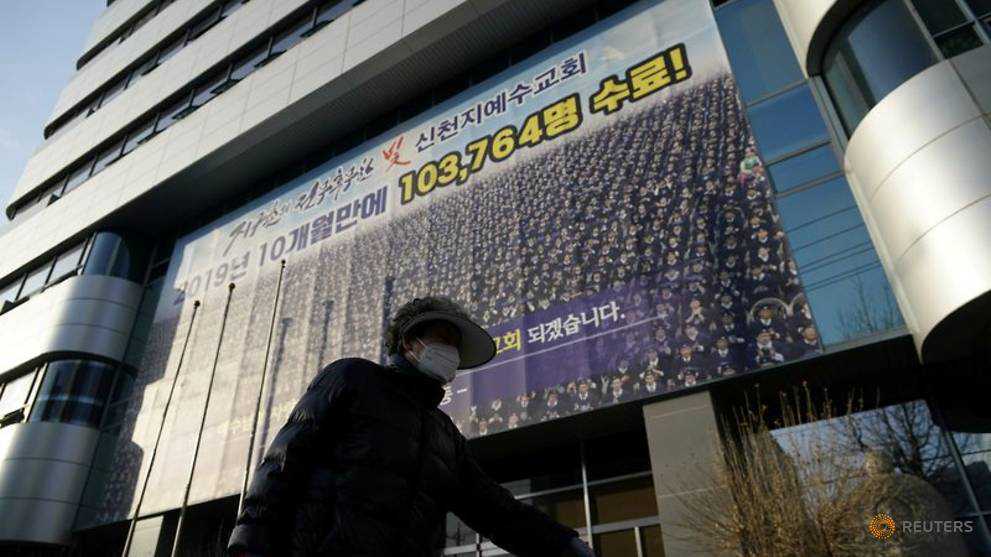Murder probe sought for South Korea sect at centre of COVID-19 outbreak
02 March, 2020

The government of Seoul asked for a murder investigation into leaders of a Christian sect at the centre of the country's deadly coronavirus outbreak, saying the church was liable for its refusal to cooperate with efforts to stop the disease.
A large most the a lot more than 4,000 confirmed cases of the South Korean outbreak, the most significant outside China but still growing, have been from the Shincheonji Church of Jesus, a secretive movement that reveres founder Lee Man-hee.
Park Won-soon, mayor of the administrative centre Seoul, said if Lee and other leaders of the church had cooperated, effective preventive measures could have saved those that later died of the virus.
"The problem is this serious and urgent, but where are the leaders of the Shincheonji, including Lee Man-hee, the principle director of the crisis?" Park said in a post on his Facebook page late on Sunday.
Seoul's city government said in another statement that it had filed a criminal complaint with the Seoul Central District Prosecutors' Office, asking for a study of Lee and 12 others on charges of murder and disease control act violations.
The prosecutors' office said it had received the complaint and was reviewing it.
Health authorities said the vast majority of the 3,000 cases confirmed in Daegu, another Korean city, were associated with a branch of the church there, in which a one who had tested positive in February attended services twice.
Many have blamed the church's secretive nature and tightly packed conditions at services for the large numbers of cases linked to it.
Yet another 600 cases were detected in the province surrounding Daegu.
South Korea's Centres for Disease Control and Prevention reported 476 new cases of the coronavirus on Monday, raising the full total to 4,212 with 22 deaths.
STIGMA, DISCRIMINATION HAMPERING CHECKS
Stigma and discrimination over their beliefs are preventing members of the religious group from cooperating with emergency checks and quarantine efforts, a top representative told AFP.
The church issued a statement on Sunday reiterating calls for an end to "stigmatisation, hatred and slander" against its followers, saying it had been cooperating with the federal government.
Health authorities said they have developed a set of 317,320 Shincheonji members and "trainees", but have been told by some local governments that it had been not exhaustive.
Many members have not taken care of immediately health officials, acknowledged Shincheonji's director of international missions Kim Shin-chang.
"It is possible our members aren't completely forthcoming with the authorities on the movements out of fear their Shincheonji affiliation could be exposed," he said.
"Social hatred and discrimination against our members is so pervasive that many fear losing their jobs or fuelling conflict among members of the family if their faith is revealed."
According to reports, a lot more than 1,000 people connected with Shincheonji have not answered survey calls.
"We've urged our members to tell the authorities everything," said Kim - but he added that doing this was a "personal decision".
"PROMISED PASTOR"
Shincheonji was founded in 1984 by Lee Man-hee, who it identifies as the "Promised Pastor", and says he has taken on the mantle of Jesus Christ.
He'll usher in your day of Judgement during his lifetime, it says - he's now 88 - and take 144,000 persons with him to be immortal high priests in heaven.
With more members than places available, Kim said, who'll be chosen is "in the hands of God".
"We believe there is merely one Promised Pastor," said Kim, 36, a born-again Christian until he joined Shincheonji 18 years back, adding that Lee "exercises positive energy that influences depends upon".
At services Shincheonji members are forbidden to wear glasses, necklaces or earrings in what Kim said is a "display of respect to God", and sit close together on to the floor.
The outbreak among its members began with a 61-year-old woman. She developed a fever on Feb 10 but attended at least four church services in Daegu - the country's fourth-largest city and epicentre of its outbreak - before being diagnosed.
Around 3,000 Shincheonji members were at each of the Daegu services she attended, Kim told AFP.
In a note to his followers, Lee has called the outbreak the "work of the devil" intended to "thwart the growth of Shincheonji".
"But we will be the sons of God," he added. "We will triumph over this challenge."
NATIONAL MERIT
Shincheonji has 12 branches in South Korea that it calls the "12 Tribes", each named after among Jesus's disciples, and is indeed successful it was able to mobilise thousands of followers to carry North Korean-style mass displays at Seoul's Jamsil Olympic Stadium in 2012, home to the 1988 Games.
At its headquarters in a nondescript six-storey building in Gwacheon, south of Seoul, dozens of awards line the walls, among them a certificate of national merit for founder Lee from ousted president Park Geun-hye - which entitles him to be buried in the country's national cemetery.
Kim denied that Shincheonji has political connections, but pictures have emerged of the founder with Park and with another former conservative president Lee Myung-bak, and their party - now renamed United Future - has shied from criticising Shincheonji over the outbreak.
Source:
TAG(s):
